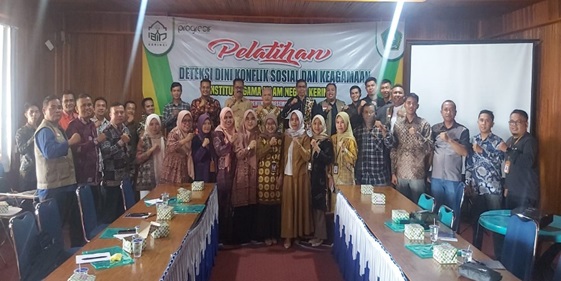Pelatihan Deteksi Dini Konflik Sosial dan Keagamaan pada Masa Pemilu di Kabupaten Kerinci dan Kota Sungai Penuh Training on Early Detection of Social and Religious Conflicts During the Election Period in Kerinci District and Sungai Penuh City
Main Article Content
Abstract
The early detection of conflict is a crucial process in conflict prevention to avoid more complex situations in society. Politically competitive activities have the potential to trigger social division and broader conflicts. This community service initiative aims to provide concrete solutions for religious-social conflicts resulting from the political process. The initiative is implemented through training and mentoring for members of the Election Supervisory Board (Bawaslu) in Kerinci District and Sungai Penuh City, involving relevant stakeholders such as the National Unity and Politics Agency (Kesbangpol), Regional Police (Polres), and the Forum for Interfaith Harmony (FKUB). Participants in the training displayed high enthusiasm by actively participating in Q&A sessions, group discussions, presentations, and providing reflections. Qualitatively, the training has positively impacted participants’ insights, attitudes, and skills in analyzing and detecting conflicts in society. Participants gained in-depth knowledge of the concept of early conflict detection and methods to identify potential conflicts before reaching higher levels of escalation. In terms of attitude, the training was effective in shaping a positive mindset and sensitivity to conflict issues, reinforcing peace values, and encouraging participants to adopt a proactive approach to conflict prevention efforts. Finally, through case studies and simulations, participants acquired the necessary skills to identify early signs of conflict and develop appropriate handling strategies.
Downloads
Article Details

This work is licensed under a Creative Commons Attribution-ShareAlike 4.0 International License.
Authors who publish with this journal agree to the following terms:
- Any article on the copyright is retained by the author(s).
- Author grant the journal, right of first publication with the work simultaneously licensed under a Creative Commons Attribution License that allows others to share work with acknowledgment of the work authors and initial publications in this journal.
- Authors are able to enter into a separate, additional contractual arrangements for non-exclusive distribution of published articles of work (eg, post-institutional repository) or publish it in a book, with acknowledgment of its initial publication in this journal.
- Authors are permitted and encouraged to post their work online (e.g., in institutional repositories or on their websites) prior to and during the submission process, as can lead to productive exchanges, as well as earlier and greater citation of published work.
- The article and any associated published material is distributed under the Creative Commons Attribution-ShareAlike 4.0 International License
References
Afandi, A., Laily, N., Wahyudi, N., Umam, M. H., & Kambau, R. A. (2022). Metodologi Pengabdian Masyarakat (Suwendi, A. Basir, & J. Wahyudi (eds.)). Direktorat Pendidikan Tinggi Keagamaan Islam Direktorat Jenderal Pendidikan Islam Kementerian Agama RI.
Amirullah, M., & Agggariani, D. (2022). Konflik Sosial pada Pilkada di Kabupaten Luwu Timur (Studi Kasus Relasi Sosial Pasca Pemilihan Bupati 2020). M a c o r A, 1(2). http://repositori.uin-alauddin.ac.id/id/eprint/19203%0Ahttp://repositori.uin-alauddin.ac.id/19203/1/MA%27RIF AMIRULLAH-FUFP.pdf
Andriyani, L., Shidqi, R. F. El, & ... (2022). Community Resilience Post-Pilkada Conflict to Supporting Social Sustainability in The Jakarta Area. Journal of Public 4(April), 45–50. https://jurnal.fisip.untad.ac.id/index.php/JPAG/article/view/301%0Ahttps://jurnal.fisip.untad.ac.id/index.php/JPAG/article/download/301/227
Astri, H. (2012). Penyelesaian Konflik Sosial Melalui Penguatan Kearifan Lokal. Aspirasi Jurnal Masalah-Masalah Sosial, 151–162. http://id.shvoong.com/social-sciences/sociology/2142189-pengertian-konflik-sosial-macam-
Deutsch, M., Coleman, P. T., & Marcus, E. C. (2006). The Handbook of Conflict Resolution: Theory and Practice. Jossey-Bass.
Diab, A. L., Pabbajah, M., Nurina Widyanti, R., Muthalib, L. M., & Fajar Widyatmoko, W. (2022). Accommodation of local wisdom in conflict resolution of Indonesia’s urban society. Cogent Social Sciences, 8(1). https://doi.org/10.1080/23311886.2022.2153413
Fisher, S. (2001). Mengelola Konflik: Keterampilan dan Strategi untuk Bertindak. Penerbit SMK Grafika.
Frenki. (2021). Analisis Politisasi Identitas dalam Kontestasi Politik pada Pemilihan Umum di Indonesia. As-Siyasi : Journal of Constitutional Law, 1(1), 29–48. https://doi.org/10.24042/as-siyasi.v1i1.8540
Halim, A., & HM, Pahrudin. (2019). The Role of Local Wisdom as Religious Conflict Resolution in Jambi Indonesia. Walisongo: Jurnal Penelitian Sosial Keagamaan, 27(2), 353–374. https://doi.org/10.21580/ws.27.2.4358
Hanan, D. (2020). Identity Politics In The 2019 Indonesian General Elections: Its Significance And Limitation. Jurnal Wacana Politik, 5(1). https://core.ac.uk/download/pdf/326773630.pdf
Harish, S. P., & Toha, R. (2019). A new typology of electoral violence: insights from Indonesia. Terrorism and Political Violence, 31(4), 687–711. https://doi.org/10.1080/09546553.2016.1277208
Herman, A. (2017). Local Press and Interest Conflict at Local Election in Central Sulawesi. 22(7), 64–74. https://doi.org/10.9790/0837-2207066474
Hui, J. Y. (2020). Social Media and the 2019 Indonesian Elections: Hoax Takes the Centre Stage. Southeast Asian Affairs, 155–171.
Kasmanto Rinaldi. (2022). The Election Conflict of Mandailing Tribe Leader: An Analysis on Victimology. International Journal of Social Science, 1(5), 675–680. https://doi.org/10.53625/ijss.v1i5.1310
Killen, M., Ardila-Rey, A., Barakkatz, M., & Wang, P. L. (2000). Preschool teachers’ perceptions about conflict resolution, autonomy, and the group in four countries: United states, colombia, el salvador, and taiwan. Early Education and Development, 11(1), 73–92. https://doi.org/10.1207/s15566935eed1101_5
Lesmana, A. C., & Sutrisno, B. (2021). Playing with Identity Politics: An Analysis Post-2019 Presidential Election. Jurnal Sosiologi USK (Media Pemikiran & Aplikasi), 15(2), 236–254. https://doi.org/10.24815/jsu.v15i2.23716
Peter, W. (2002). Understanding Conflict Resolution: War Peace and the Global System. SAGE Publications. http://site.ebrary.com/id/10080961
Prasojo, Z. H., & Pabbajah, M. (2020). Akomodasi Kultural Dalam Resolusi Konflik Bernuansa Agama Di Indonesia. Aqlam: Journal of Islam and Plurality, 5(1). https://doi.org/10.30984/ajip.v5i1.1131
Qodir, Z., Jubba, H., & Hidayati, M. (2022). Contesting Ethnic and Religious Identities in the 2019 Indonesian Elections: Political Polarization in West Kalimantan. Studia Islamika, 29(1), 111–142. https://doi.org/10.36712/sdi.v29i1.12940
Surjo, J., & Qodir, Z. (2013). Gandong Amidst the Religious Conflicts.
Waisová, Š. (2015). Environmental cooperation and conflict transformation. Central European Journal of International and Security Studies, 9(2), 92–116.
